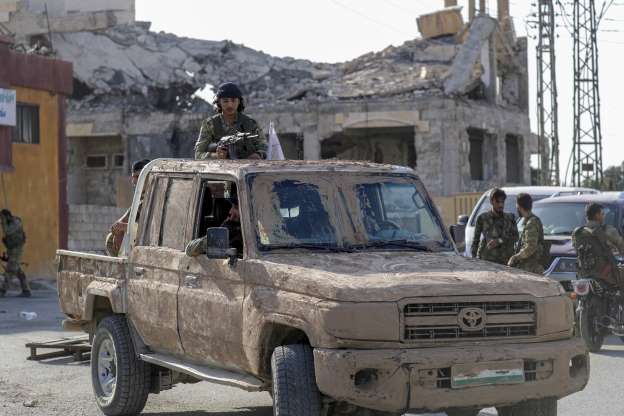By Dana Khraiche and Selcan Hacaoglu, Bloomberg News–
Syrian government forces began fanning out in the northeast after striking a deal with Kurdish fighters abandoned by their U.S. allies to a Turkish military offensive — a major shift that could see President Bashar al-Assad cement his impending victory in the country’s long war.
Syria’s army deployed in Al Tabqa airbase and Ain Issa and was now stationed six kilometers away from the border with Turkey, according to Syria’s Al Ekhbariyah TV, which showed footage of soldiers carrying Syrian flags being welcomed by local residents.
Turkey’s President Recep Tayyip Erdogan played down the threat of an immediate escalation between his army and Assad’s forces due to Russian mediation over the future of two key border towns — Manbij and Kobani.
Russians are working to avert a “negative” outcome in the border town of Kobani, which Kurds seized back from Islamic State in 2015 with U.S. support, and Turkey did not intend to take control of Manbij, Erdogan told reporters in Istanbul.
The Syrian deployment comes after the Kurdish command for the northeast, which with American protection had controlled about a third of the country, said it had called in Assad’s forces in the face of a rapid Turkish advance that has drawn international condemnation and the threat of sanctions.
Erdogan launched the offensive on Wednesday, after receiving assurances from Trump that U.S. troops, who supported the Syrian Kurdish YPG militia during five years of grinding war to defeat Islamic State, would stand aside.
He said the offensive, which aims to push back Syrian Kurdish fighters linked to the separatist PKK group that has battled the Turkish government for decades, was nearly complete. Turkey’s aim is to carve out a buffer zone inside Syrian territory to protect its own border and resettle Syrian refugees.
Who Are the Syrian Kurds the U.S. Is Abandoning?: QuickTake
“The Syrians look highly vulnerable and lightly armed in the absence of air power and probably won’t be moving toward a serious engagement with the Turks or Turkish-backed militias without it,” said Bob Bowker, a visiting fellow specializing in Arab and Islamic studies at the Australian National University in Canberra. “The U.S. withdrawal means we’re probably witnessing the end of the ambition of an autonomous Kurdish region for the foreseeable future.”
Kurdish-led forces have tens of thousands of Islamic State fighters, their families, sympathizers and others in their custody in prisons and camps in the northeast. They’ve warned that they will not be able to secure those areas while fending off an offensive by Turkey. Even Trump allies have warned that chaos in the area could lead to an Islamic State resurgence.
U.S. Secretary of Defense Mark Esper said on CBS that Trump had directed the deliberate withdrawal of American troops from northern Syria due to an expected increase in military action.
Trump Has Ordered Troop Withdrawal From N. Syria, Esper Says (2)
For the Kurds, inviting in Assad could come at a heavy price. The move may succeed in pushing Turkey back across the border but will likely mean allowing Damascus to take back control over the northeast after eight years of bruising civil war that has claimed some 500,000 lives and displaced millions.
“As far as the Syrian forces’ advance, Russia has always wanted the government to recover control of as much territory as possible,” Elena Suponina, a Moscow-based Middle East expert, said. “Now that this opportunity has presented itself the Syrian army’s actions are absolutely justified.”
Sanctions
Facing a backlash at home and abroad, Trump has defended his move by saying he did not support the Turkish offensive. On Sunday, he said the U.S. Treasury had further sanctions ready to impose on Turkey. He gave no timeline.
European Union leaders may also settle on an arms embargo on Turkey over its advance into Syria as soon as this week, four officials familiar with the discussions said. Germany and France said Saturday they stopped shipments of military equipment to their NATO ally.
EU government envoys in Brussels discussed on Sunday the draft of a decision adopting punitive measures against Turkey over Syria, as well as its drilling activities off the coast of Cyprus.
EU Leaders May Impose Weapons Embargo on Turkey Over Syria (1)
(Recasts with changes throughout.)
–With assistance from Nikos Chrysoloras, Samer Khalil Al-Atrush and Jason Scott.
To contact the reporters on this story: Dana Khraiche in Beirut at dkhraiche@bloomberg.net;Selcan Hacaoglu in Ankara at shacaoglu@bloomberg.net
To contact the editor responsible for this story: Lin Noueihed at lnoueihed@bloomberg.net
For more articles like this, please visit us at bloomberg.com
©2019 Bloomberg L.P.


Leave A Comment
You must be logged in to post a comment.